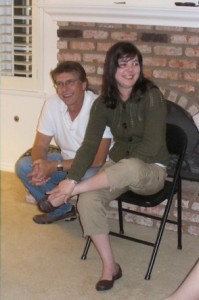*This post is in response to @wawoodworth TEDucation: 5 TED Talks Librarians Should Watch (and Why)
The keys to innovation in science and in librarianship are to relax, look at things with a new perspective and then: solve a problem, create efficiency, find a new way of looking at things that creates order out of chaos. Conference budgets may be finite but thanks to the Internet there are plenty of ways to seek inspiration from other professionals without traveling hundreds of miles or spending thousands of dollars.
5 TED talks you don?t want to miss!
TED2003 Don Norman on 3 ways good design makes you happy
There’s a tendency to get very process oriented, we all have goals and our focus narrows to achieving those goals as efficiently as possible. Yet, if we take a moment to think about the goods and services which we use the ones we stick with are those that amuse, inspire, fill a void in our lives or otherwise cause us to connect emotionally. Join Don Norman for a delightful look at what good design is and how we can apply those principles to what we create.
TEDWomen 2010 – Sheryl Sandberg: Why we have too few women leaders
It’s the irony of libraries and the life sciences, these areas traditionally have a strong female presence, but the majority of the leadership in these areas are still the stereotypical older white male. This inspiring talk by Sheryl Sandberg shares several of the things which hold women back (some of these things also hold male introverts back). Even if you don’t think this topic is relevant I challenge you to listen to this talk and think about the example situations she mentions from her own life. Many of these situations can be changed just by paying attention to others, acknowledging someone’s good work, or raising your hand. For men and women who choose to take time out to raise a family she provides advice for how to set yourself up to reenter the workforce when your ready at the level you want to.
TEDGlobal 2010 – Sugata Mitra: The child-driven education
Sugata Mitra reminds us that children are very smart and capable of learning anything if they are motivated and receive positive support. ?His educational ideas will not solve all of our problems, or even be appropriate in all circumstances. ?But, I think they do have a lot of potential for inspiring educators to allow more self-directed learning and to reach people who otherwise would not have access. ?(And it provides more ammunition for those of us who want to see more doing and less lecturing in education!)
TED2011 – Deb Roy: The birth of the word
Most people don?t understand what we do, that?s our fault for not expressing ourselves clearly. ?Deb Roy had his entire house wired for video to examine how his infant son learned and began using words. ?He analyzed how and why we learn new words and concepts. ?Reflecting on how we learn to communicate will, I hope, inspire you to think about how you express yourself to others. ?Instead of telling people what we do with lots of jargon, try explaining your job as you would to a child, briefly and accurately, and not a recitation of your position description.
TEDxPuget Sound 2009 – Simon Sinek: How great leaders inspire action
You may think you aren’t a leader, maybe you don’t want to be a leader, but libraries and science are both in desperate need of great leaders. In addition to recognizing and nurturing talent being a great leader requires good communication skills. Using Apple as an example Simon Sineak identifies what’s necessary for communicating effectively and ties his theories into biology. He then challenges us to pursue the things that we are passionate about in order to succeed.
What are your TED talks to watch?


